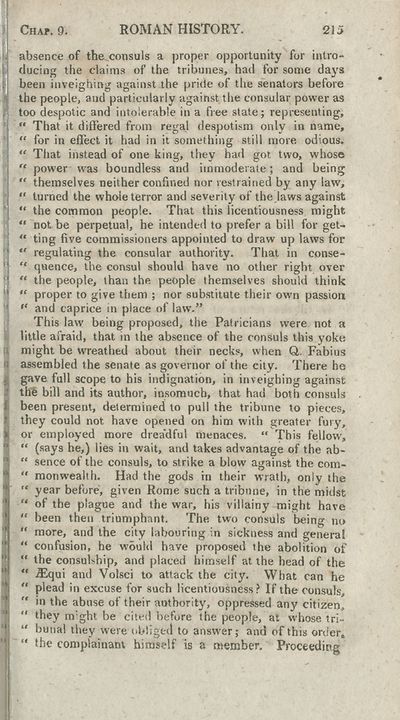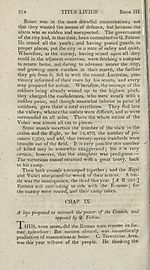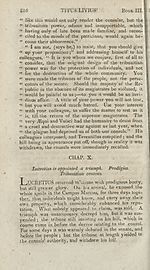Download files
Complete book:
Individual page:
Thumbnail gallery: Grid view | List view

Chap. 9.
ROMAN HISTORY.
215
absence of the consuls a proper opportunity for intro¬
ducing the claims of the tribunes, had for some days
been inveighing against-the pride of the senators before
the people, and particularly against the consular power as
too despotic and intolerable in a free state; representing,
“ That it differed from regal despotism only in name,
“ for in effect it had in it something still more, odious.
“ That instead of one king, they had got two, whose
“ power was boundless and immoderate; and being
“ themselves neither confined nor restrained by any law,
“ turned the whole terror and severity of the laws against
“ the common people. That this licentiousness might
“ not be perpetual, he intended to prefer a bill for get-
" ting five commissioners appointed to draw up laws for
*' regulating the consular authority. That in conse-
“ quence, the consul should have no other right over
" the people, than the people themselves should think
“ proper to give them ; nor substitute their own passion
‘‘ and caprice in place of law.”
This law being proposed, the Patricians were not a
little afraid, that in the absence of the consuls this yoke
might be wreathed about their necks, when Q. Fabius
assembled the senate as governor of the city. There he
gave full scope to his indignation, in inveighing against
the bill and its author, insomuch, that had both consuls
been present, determined to pull the tribune to pieces,
they could not have opened on him with greater fury,
or employed more drea'dful menaces. “ This fellow',
“ (says he,) lies in wait, and takes advantage of the ab-
“ sence of the consuls, to strike a blow against the com-
“ monwealth. Had the gods rn their wrath, only the
“ year before, given Rome such a tribune, in the midst
“ of the plague and the war, his villainy might have
“ been then triumphant. The two consuls being no
“ more, and the city labouring in sickness and general
“ confusion, he would have proposed the abolition of
" the consulship, and placed himself at the head of the
“ iEqui and Volsci to attack the city. What can he
“ plead in excuse for such licentiousness? If the consuls,
" in the abuse of their authority, oppressed any citizen,
" they might be cited before the people, at whose tri-
“ buna! they were obliged to answer; and of this order.
“ the complainant himself is a member. Proceeding
ROMAN HISTORY.
215
absence of the consuls a proper opportunity for intro¬
ducing the claims of the tribunes, had for some days
been inveighing against-the pride of the senators before
the people, and particularly against the consular power as
too despotic and intolerable in a free state; representing,
“ That it differed from regal despotism only in name,
“ for in effect it had in it something still more, odious.
“ That instead of one king, they had got two, whose
“ power was boundless and immoderate; and being
“ themselves neither confined nor restrained by any law,
“ turned the whole terror and severity of the laws against
“ the common people. That this licentiousness might
“ not be perpetual, he intended to prefer a bill for get-
" ting five commissioners appointed to draw up laws for
*' regulating the consular authority. That in conse-
“ quence, the consul should have no other right over
" the people, than the people themselves should think
“ proper to give them ; nor substitute their own passion
‘‘ and caprice in place of law.”
This law being proposed, the Patricians were not a
little afraid, that in the absence of the consuls this yoke
might be wreathed about their necks, when Q. Fabius
assembled the senate as governor of the city. There he
gave full scope to his indignation, in inveighing against
the bill and its author, insomuch, that had both consuls
been present, determined to pull the tribune to pieces,
they could not have opened on him with greater fury,
or employed more drea'dful menaces. “ This fellow',
“ (says he,) lies in wait, and takes advantage of the ab-
“ sence of the consuls, to strike a blow against the com-
“ monwealth. Had the gods rn their wrath, only the
“ year before, given Rome such a tribune, in the midst
“ of the plague and the war, his villainy might have
“ been then triumphant. The two consuls being no
“ more, and the city labouring in sickness and general
“ confusion, he would have proposed the abolition of
" the consulship, and placed himself at the head of the
“ iEqui and Volsci to attack the city. What can he
“ plead in excuse for such licentiousness? If the consuls,
" in the abuse of their authority, oppressed any citizen,
" they might be cited before the people, at whose tri-
“ buna! they were obliged to answer; and of this order.
“ the complainant himself is a member. Proceeding
Set display mode to:
![]() Universal Viewer |
Universal Viewer | ![]() Mirador |
Large image | Transcription
Mirador |
Large image | Transcription
| Antiquarian books of Scotland > Curiosities & wonders > Titus Livius' Roman history > (219) |
|---|
| Permanent URL | https://digital.nls.uk/115985777 |
|---|
| Description | Thousands of printed books from the Antiquarian Books of Scotland collection which dates from 1641 to the 1980s. The collection consists of 14,800 books which were published in Scotland or have a Scottish connection, e.g. through the author, printer or owner. Subjects covered include sport, education, diseases, adventure, occupations, Jacobites, politics and religion. Among the 29 languages represented are English, Gaelic, Italian, French, Russian and Swedish. |
|---|

